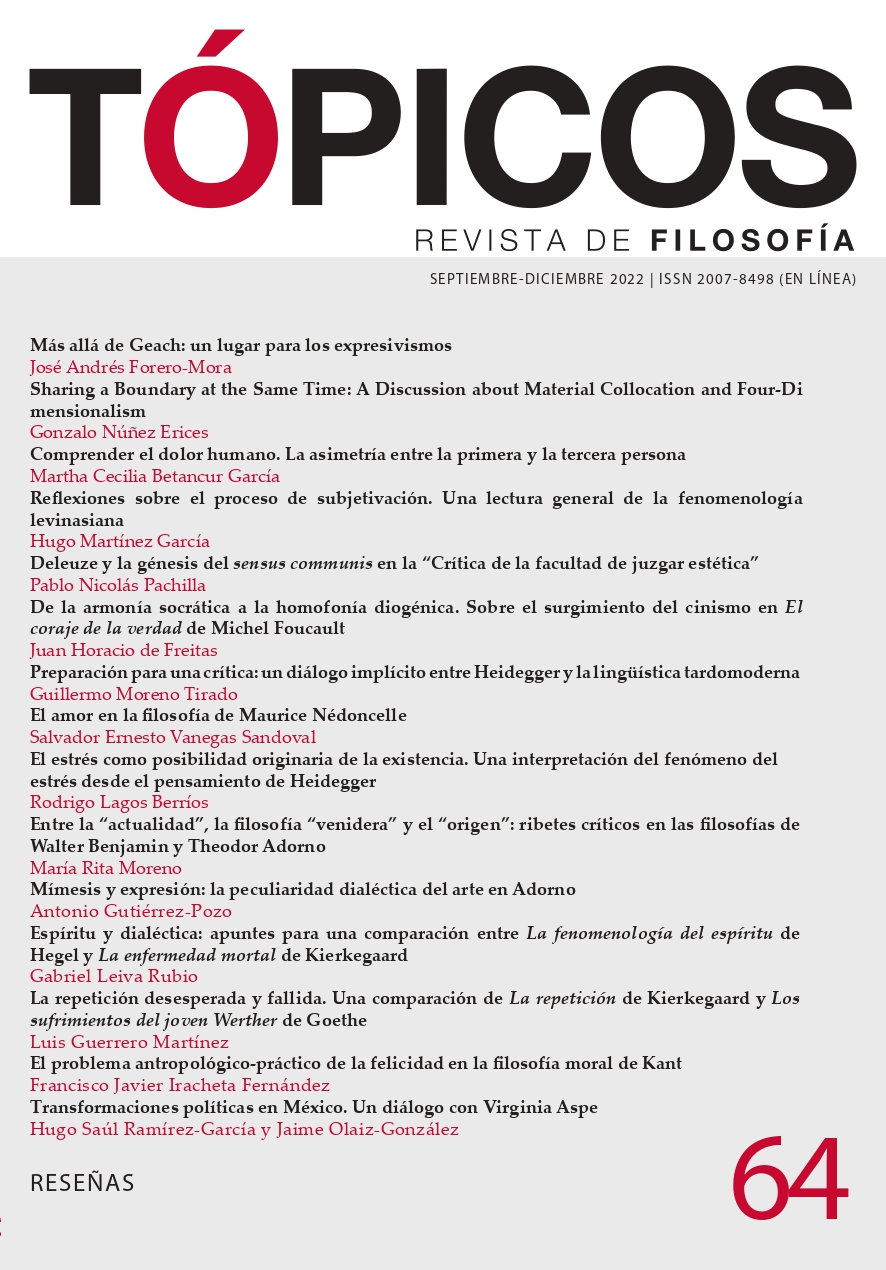The Practical-Anthropological Problem of Happiness in Kant's Moral Philosophy
Publiée 2022-08-13
Mots-clés
- metafísica moral,
- antropología práctica,
- felicidad,
- libertad,
- razón práctica
(c) Copyright Tópicos, Revista de Filosofía 2022

Ce travail est disponible sous licence Creative Commons Attribution - Pas d'Utilisation Commerciale - Pas de Modification 4.0 International.
Comment citer
Résumé
Kant’s moral philosophy intends to be an articulated project between metaphysics of morals and practical anthropology. In the works in which he undertakes the task of grounding his metaphysics of morals, namely, The Groundwork of the Metaphysics of Morals and the Critique of Practical Reason, Kant insists that he borrows nothing from anthropology to support this grounding, whereas in his two other most important practical writings, the Religion Within the Boundaries of Mere Reason and the Metaphysics of Morals, Kant applies his metaphysics of morals to anthropology. By discussing Kant’s idea that empirical happiness is an essential end for every human being, and that his metaphysics of morals is just incoherent without denying rationality and freedom to every sensible incentive, this paper problematizes the possibility of the articulated project of Kant’s moral philosophy.
Références
- Allison, H. (1991). Kant’s Theory of Freedom. Cambridge University Press.
- Aune, B. (1979). Kant’s Theory of Morals. Princeton University Press.
- Beck, L. W. (1960). A Commentary on Kant’s Critique of Practical Reason. The Universiy of Chicago Press.
- Bittner, R. (1974). Maximen. En G. Funke y J. Kopper (eds.), Akten des 4. internationalen Kant-Kongresses: Mainz, 6.–10. April 1974. (pp. 485-498). De Gruyter.
- Bittner, R. (2001). Doing Things for Reasons. Oxford University Press.
- Bittner, R. y Cramer, K. (1975). Materialen zu Kants “Kritik der praktischen Vernunft”. Suhrkamp.
- Chamberlin, H. (2013). Korsgaard and the Wille/Willkür Distinction: Radical Constructivism and the Imputability of Immoral Actions. Kant Studies Online, 72-101. URL: https://kantstudiesonline.net/uploads/files/GianniniHeidi01013.pdf.
- Cicerón, M. T. (2006). Sobre los deberes. J. Guillén Cabañero (trad.). Alianza.
- Darwall, S. (1983). Impartial Reasons. Cornell University Press.
- Edwards, J. (2000). Self-Love, Anthropology, and Universal Benevolence in Kant’s Metaphysics of Morals. The Review of Metaphysics, 23(4), 887-914.
- Fonessu, L. (2008). Mandatos y consejos en la filosofía práctica moderna. Isegoria, 39, 129-152.
- Herman, B. (1993). The Practice of Moral Judgment. Harvard University Press.
- Hills, A. (2006). Kant on Happiness and Reason. History of Philosophy Quarterly, 23(3), 243-261.
- Hudson, H. (1991). Wille, Willkür and the Imputability of Immoral Actions. Kant-Studien, 82(2), 179-196.
- Irwin, T. (1984). Morality and Personality: Green and Kant. En A. W. Wood (ed.), Self and Nature in Kant’s Philosophy. (pp. 31-56). Cornell University Press.
- Irwin, T. (1996). Kant’s Criticisms of Eudaemonism. En S. Engstrom y J. Whiting (eds.), Aristotle, Kant, and the Stoics: Rethinking Happiness and Duty. (pp. 63-101). Cambridge University Press.
- Johnson, A. (2005). Kant’s Empirical Hedonism. Pacific Philosophical Quarterly, 86, 50-63.
- Kant, I. (1993). La metafísica de las costumbres. A. Cortina Orts (trad.). Tecnos.
- Kant, I. (2005a). Crítica de la razón práctica. D. M. Granja Castro (trad.). FCE-UAM-UNAM.
- Kant, I. (2005b). Religion Within the Boundaries of Mere Reason. En The Cambridge Edition of the Works of Immanuel Kant: Religion and Rational Theology. (pp. 39-216). G. di Giovanni (trad.). Cambridge University Press.
- Kant, I. (2006). Kritik der Urteilskraft. Meiner.
- Kant, I. (2011). Critica de la razón pura. M. Caimi (trad.). FCE-UAM-UNAM.
- Kant, I. (2014). Antropología en sentido pragmático. D. M. Granja Castro, G. Leyva y P. Sorandt (trads.). FCE-UAM-UNAM.
- Kant, I. (2016). La religión dentro de los límites de la mera razón. F. Martínez Marzoa (trad.). Alianza.
- Kant, I. (2017). Die Religion innerhalb der Grenzen der bloßen Vernunft. Reclam. URL: http://www.gutenberg.org/files/56182/56182-h/56182-h.htm.
- Kant, I. (2018). Vorlesungen über die Metaphysik. Wentwoth Press.
- Korsgaard, C. (1996). Creating the Kingdom of Ends. Cambridge Univ. Press.
- Korsgaard, C. (2008). The Constitution of Agency. Oxford University Press.
- Kohl, M. (2015). Kant on Determinism and the Categorical Imperative. Ethics, 125(2), 331-356.
- Marey, M. (2017). El rol de la felicidad ajena en la filosofía práctica de Kant. Diánoia, 62(78), 119-145.
- Meerbote, R. (1982). Wille and Willkür in Kant’s Theory of Action. En G. S. Moltke (ed.), Interpreting Kant. (pp. 68-89). University of Iowa Press.
- Murphy, J. B. (2001). Practical Reason and Moral Psychology in Aristotle and Kant. Social Philosophy and Policy, 18, 257-299.
- Noller, J. (2019). “Practical Reason Is Not the Will”: Kant and Reinhold’s Dilemma. European Journal of Philosophy, 27, 852-864.
- O’Neill, O. (1975). Acting on Principle: An Essay on Kantian Ethics. Columbia Univ. Press.
- Prauss, G. (1983). Kant über Freiheit als Autonomie. Suhrkamp.
- Reinhold, K. L. ([1792] 2008). Briefe über die Kantische Philosophie. II. Basel Schwabe.
- Rivera Castro, F. (2014). Virtud, felicidad y religión en la filosofía moral de Kant. UNAM.
- Schneewind, J. (1998). The Invention of Autonomy. Cambridge University Press.
- Sikka, S. (2007). On the Value of Happiness: Herder contra Kant. Canadian Journal of Philosophy, 37(4), 515-546.
- Sidgwick, H. (1888). The Kantian Conception of Free Will. Mind, 13, 405-412.
- Theunissen, N. (2013). Kant’s Commitment to Metaphysics of Morals. European Journal of Philosophy, 24(1), 103-128.





